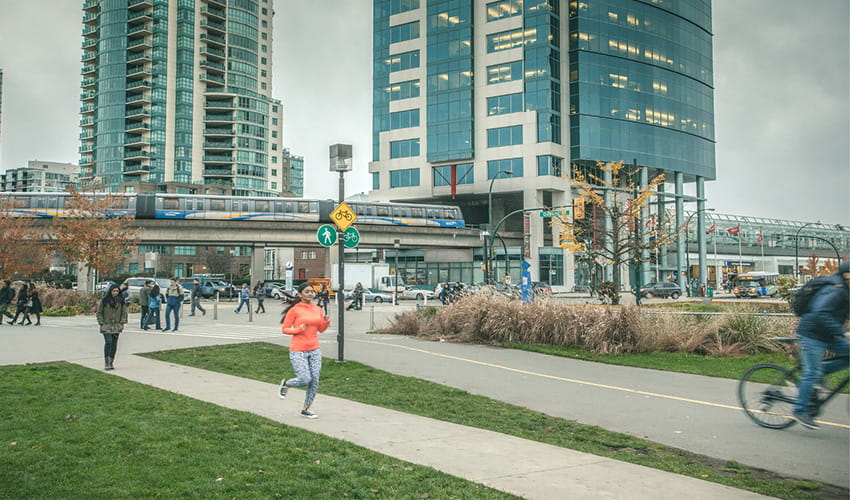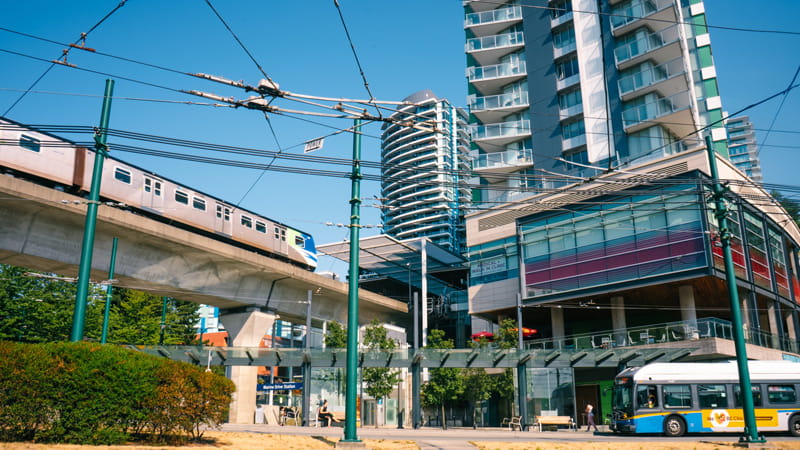Compass for Developments

In order to meet TransLink’s Transport 2050 targets such as increasing active transportation and transit trips, reducing congestion, and lowering greenhouse gas emissions, developers can help provide more and better options for building occupants to walk, cycle, transit, carpool, and carshare to and from their new development.
These efforts can enhance neighbourhood livability while delivering benefits to residents, commercial tenants, employees, the developer, and the region.
What is Compass for Developments?
The Compass for Developments program allows developers to make a one-time bulk payment to TransLink to satisfy municipal Transportation Demand Management (TDM) requirements for transit benefits, while allowing stratas and/or property managers to facilitate the distribution of the transit benefits to occupants.
This program contributes to municipal TDM requirements by reducing the reliance on parking and single-occupancy vehicle trips, while delivering benefits to building occupants, developers, and the region.
To see if your development is suitable for the Compass for Developments program, please review TransLink’s TDM Checklist.
Compass for Development Projects
Yarrow East Village
In spring 2024, TransLink and PCI Developments partnered to provide 94 pre-loaded Compass Cards to tenants of Yarrow East Village, a newly developed residential building in Vancouver. Running from mid-April to mid-July, the intention of the project was to help TransLink better understand the benefits of incentivizing sustainable transportation for those who live in transit-oriented developments.
During the study, transit usage was tracked with participants’ permission. Participants were also encouraged to fill out surveys and provide feedback on the program’s effectiveness. TransLink’s goal is to offer the Compass for Developments Program to transit-oriented developments across the region to encourage increased transit use. TransLink is in the process of finalizing the project data, which will be shared with developers and municipalities to demonstrate the benefits of developer-funded transit subsidies.
Yarrow East Village is a transit-oriented development located near the Kootenay Loop, which serves nine bus routes – including the R5 RapidBus – throughout Vancouver, Burnaby, North Vancouver, and the Tri-Cities.
Resources
King George HUB
Transit subsidies are already an option for developers to meet building sustainability requirements in some municipalities, however, there is a lack of data and studies in this area. In October 2022, TransLink partnered with PCI Developments to launch a first of its kind pilot of the Compass for Developments program.
A key objective of the pilot was to gain a better understanding of the potential benefits and outcomes associated with providing transit subsidies to residents. This was accomplished through analysis of Compass Card usage as well as responses to intake and exit surveys by pilot participants. The goal of such demonstration pilots was to build the case for a regionally coordinated approach to TDM, which would include a requirement for developers to enroll in the Compass for Developments program. To achieve this, partnerships with regional municipalities who are responsible for establishing and enforcing local TDM bylaws would need to be established, along with cooperation from the development community.
PCI Developments allocated $45,000 to offer 300 Compass Cards preloaded with $150 in stored value to residents and employees of King George Hub. King George Hub is a transit-oriented development in Surrey that is located next to the King George Skytrain station. King George station is served by the Expo Line, which serves Downtown Vancouver, Burnaby, New Westminster, and Surrey.
Resources
How to Enroll
Get your Compass for Developments Program started in a few easy steps:
-
Connect with our team: Send us an email at tdmdevelopment@translink.ca and let us know you’re interested in learning more.
-
Initial consultation: We’ll provide an overview of the program and discuss your specific needs.
-
Onboarding: We’ll make sure things are set up to match your preferences.
-
Payment: All payments are prepaid and processed by Electronic Funds Transfer.
-
Launch support: We’ll provide marketing materials to support your roll-out.
-
Data collection and monitoring: We’ll provide regular updates with data on program performance.
Additional resources
To register your interest and learn about how your next development could participate in the Compass for Developers Program, email tdmdevelopment@translink.ca.
Program Benefits
For Developers
Potentially reduce development costs
Opportunities to reduce parking space requirements or repurpose parking for other uses
Lower costs for onsite parking administration and maintenance
Increase attractiveness and marketability of developments
Improve transportation equity
Enhance community perception of new development
Contribute towards sustainable/green building ratings
Demonstrate environmental, corporate, and social responsibility
Reduce adverse traffic impacts of new developments (air, noise, congestion)
For Commercial Tenants
Improve employee health and wellness
Demonstrate climate leadership and reduce climate impact
Support recruitment by attracting a wider, more diverse pool of applicants
Increase attractiveness and marketability of developments
Offer additional benefits beyond financial compensation
Show measurable progress against sustainability goals
For Residents and Employees
Lower commuting costs
Lower costs for housing and parking
Reduce personal climate impact
Improve health and wellness
More space to listen, read, or socialize during commutes
TDM Guidelines for Development in Metro Vancouver

The Transportation Demand Management (TDM) Guidelines were created to provide best practice and insight to developers and municipalities on how to incorporate TDM strategies into new developments. They are structured around four themes that cover the spectrum of process, strategies, context and evaluation that comprise the essential components of TDM planning.
TDM Processes and Requirements
Understand current regional processes, mechanisms for enforcement, and potential new processes (based on TDM practices in other jurisdictions).
TDM Strategies Toolkit
Learn key considerations when deciding when and what to implement. Understand how goals and targets frame the scale of need for TDM strategies, building around core strategies to achieve a favorable cost-benefit based on the level of investment.
TDM in Different Contexts
Review TDM strategies that are location-specific or better suited to certain development contexts (e.g., residential, office, retail, industrial). For instance, offering transit subsidies for projects located close to the frequent transit network.
Forecasting and Evaluating Impacts
One of the key components of a successful TDM program is assessing impacts on the transportation system and target audience. Discover key evaluation metrics and tools for collecting data to inform decision-making processes.
Learn more about our efforts to create transit-oriented communities.

